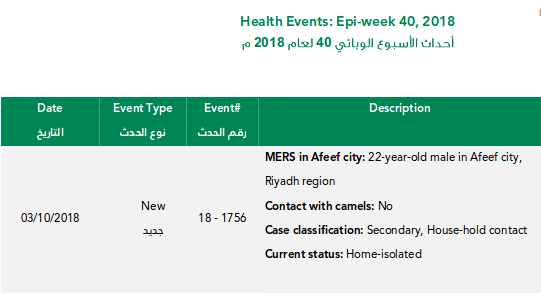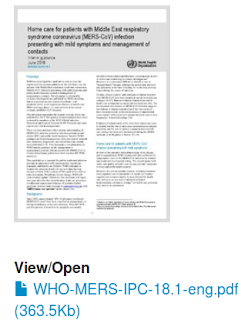#13,559
Last week the Saudi MOH reported 3 MERS cases, one of which was described as a 50 y.o. male - already deceased - from Afeef City (aka `Afif'). The case was described as `primary, community acquired', with no camel contact (see below).
Today the Saudi MOH is reporting a secondary, household contact in Afeef has tested positive, and is being kept in home isolation.
Given the status of `home-isolated', it is reasonable to assume this patient is either only very mildly ill, or is (hopefully) completely asymptomatic, and was only detected through routine lab testing of close contacts of the first patient.
Things become considerably more complicated (and riskier) if the patient is showing any - even mild - symptoms. Which brings us to June 2018 interim WHO guidance update called:
Home care for patients with Middle East respiratory syndrome coronavirus (MERS-CoV) infection presenting with mild symptoms and management of contacts: interim guidance
WHO-MERS-IPC-18.1-eng.pdf (363.5Kb)
CitationHere, patients may be exhibiting a low grade fever, or mild respiratory and/or gastrointestinal symptoms - and while their ability to transmit the virus remains unquantified - the risks are likely higher. And the patient, due to age or co-morbidities - may be at a higher risk of developing complications.
World Health Organization. (2018). Home care for patients with Middle East respiratory syndrome coronavirus (MERS-CoV) infection presenting with mild symptoms and management of contacts: interim guidance. World Health Organization. http://www.who.int/iris/handle/10665/272948.
License: CC BY-NC-SA 3.0 IGO
Hospitalization, as the following excerpt states, is the preferred option.
In view of the currently limited knowledge of the disease and its transmission, WHO recommends that confirmed (2) symptomatic cases of the MERS-CoV infection be isolated and monitored in a hospital setting. This would ensure both safety and quality of health care (in case patients’ symptoms worsen) and public health security.
However, for several possible reasons, including situations when inpatient care is unavailable or unsafe (i.e. limited capacity and resources unable to meet demand for health care services), or in a case of informed refusal of hospitalization, alternative settings 2 for health care provision may need to be considered.
For these cases, earlier this summer the World Health Organization released another guidance document on Home Care For Patients With Mild Or Asymptomatic MERS-CoV Infection.



